Derek Thomas is minister of preaching and teaching at First Presbyterian Church in Columbia, South Carolina. He is editorial director of the Alliance of Confessing Evangelicals and distinguished visiting professor of systematic and historical theology at Reformed Theological Seminary.
Author of:
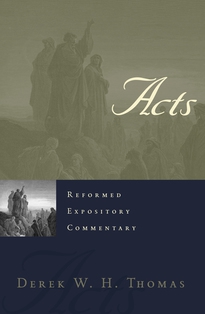
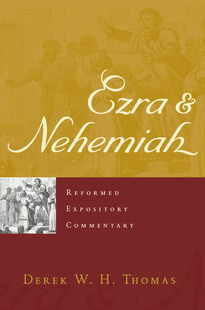
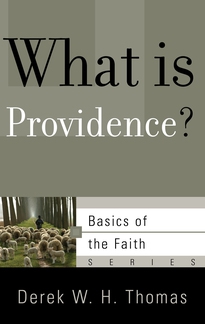
The church in our time easily loses sight of her mission to witness to the resurrected Christ. Studying Acts identifies us with the early church and the way the gospel shaped her as she began witnessing in Judea and continuing, in concentric circles, “to the end of the earth.” Acts reminds us that the story of the church remains incomplete—that there continues to this day an “Acts 29.”
We face relentless opposition as our postmodern world mirrors the world of the apostles. Planting and growing churches in such an environment poses particular challenges. Nevertheless, Acts clearly demonstrates that no obstacle can withstand the power of the Holy Spirit. As he did in the early church, the Holy Spirit teaches us in Acts to “expect great things.”
As are all the books in the Reformed Expository Commentary series, this exposition of Acts is accessible to both pastors and lay readers. Each volume in the series provides exposition that gives careful attention to the biblical text, is doctrinally Reformed, focuses on Christ through the lens of redemptive history, and applies the Bible to our contemporary setting.
Endorsements
“Somewhere along the way the idea developed that commentaries are supposed to be a resource, but are not necessarily very readable. Derek Thomas and his treatment of Acts defy convention. Here you have a most readable, insightful, and enjoyable book for all. . . . A great gift for the church.”
—Stephen J. Nichols, Research Professor of Christianity and Culture, Lancaster Bible College, Lancaster, Pennsylvania
About the Series
All the books in the Reformed Expository Commentary series are accessible to both pastors and lay readers. Each volume in the series provides exposition that gives careful attention to the biblical text, is doctrinally Reformed, focuses on Christ through the lens of redemptive history, and applies the Bible to our contemporary setting.
The books of Ezra and Nehemiah tell a vital story of a community revived and restored by God’s grace through gifted individuals—preparing the way for the coming Messiah. In his practical and devotional expository commentary, pastor-theologian Derek W. H. Thomas shows what this gripping narrative can teach us about kingdom life in our own time. In their different ways, Ezra and Nehemiah both prioritized the Word of God and the practice of prayer. If the church of our day is to recover and be renewed, Thomas argues, these commitments are just as vital for us as well.
Endorsements
“Derek Thomas has the happiest knack of leading his readers right into the heart of the biblical text. . . . He tackles the intriguing (and too-neglected) books of Ezra and Nehemiah, and through him we not only enter into fruitful contact with the Bible but also meet with two of the most attractive characters that the Old Testament offers.”
—Alec Motyer, Previously Old Testament Editor, The Bible Speaks Today commentary series
Few things distinguish Christian and secular worldviews with greater clarity than the doctrine of providence: that everything that happens is the outcome of the sovereign overruling of God—everything! Derek W. H.Thomas examines this truth by observing how the Bible explains the complex lives of men and women, and also by weighing opposing viewpoints, including Open Theism and Molinistic views of “middle knowledge.”
Basics of the Faith booklets introduce readers to basic Reformed doctrine and practice. On issues of church government and practice they reflect that framework—otherwise they are suitable for all church situations.
Endorsements
“Derek Thomas is well qualified to write on the subject of providence. He wonderfully combines in one person the lucidity of a professor of theology, the sensitivity of a gifted pastor, and the personal experience of a Christian who has learned much about God’s ways in his own life. He is the ideal ‘Mr Interpreter’ to plot our way through life with a deep confidence in God’s wise and sovereign love. The value of What Is Providence? is out of all proportion to its size. Here is a booklet to read, mark, learn, and inwardly digest. And once you have done that, buy a little stock so that you always have one to give to those who ask, ‘Why did God . . . .?'”
—Sinclair Ferguson
About the Series
Basics of the Faith booklets introduce readers to basic Reformed doctrine and practice. On issues of church government and practice they reflect that framework—otherwise they are suitable for all church situations.
Co-Editor of:
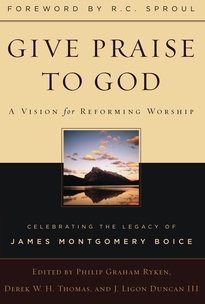
Give Praise to God: A Vision for Reforming Worship edited by Philip Graham Ryken, J. Ligon Duncan III, and Derek W.H. Thomas
This call for the doxological reformation of the church is offered to “ministers who lead their congregations in worship, musicians who seek a deeper understanding of the spiritual purpose of their work, [and] seminary students who are clarifying their commitment to biblical worship. . . .”
Give Praise to God continues the legacy of James Montgomery Boice by examining the biblical foundations for worship, the warranted elements of corporate worship, worship in the home and in all of life, and worship throughout the ages.
Contributors, in addition to the editors, are Marion Clark, Edmund Clowney, Mark Dever, William Edgar, Robert Godfrey, Michael Horton, Terry Johnson, Paul Jones, Albert Mohler, N. R. Needham, Hughes Old, Richard Phillips, and Donald Whitney. Not all agree on every particular, nor do readers need to in order to benefit from these thoughtful discussions of how to worship God biblically.
Endorsements
“Worship is a matter of controversy in the present generation, as it has frequently been in past generations. Give Praise to God will give readers a biblical, well-reasoned, and historically informed understanding of a Reformed perspective on worship presented by some of the best Reformed thinkers of our day.”
—L. Roy Taylor
Contributor to:
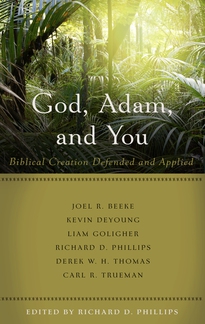
God, Adam, and You: Biblical Creation Defended and Applied edited by Richard D. Phillips
What difference does Adam make? The answer, to many Christians today, is “not much.”
Adam, we are told, is a mythological figure who can safely be abandoned without compromising the authority and infallibility of Scripture. After all, is holding on to a historical Adam more important than downplaying Genesis 1–3 enough to mediate the gospel to our secular culture?
The Philadelphia Conference on Reformed Theology joins with historic Christianity in saying that yes, it is. Adam is not only necessary to our Christian faith and witness, but he makes a world of difference to our understanding of God, mankind, the Bible—and even the gospel itself.
The following contributors examine what the truth of Adam means about the truth of Scripture as a whole, how he shows us what it means to bear God’s image, and what an understanding of Adam teaches us about Christ.
- Derek W. H. Thomas: The Bible’s First Word
- Joel R. Beeke: The Case for Adam
- Kevin DeYoung: Two Views of the Human Person
- Liam Goligher: Adam, Lord of the Garden
- Richard D. Phillips: The Bible and Evolution
- Richard D. Phillips: God’s Design for Gender, Marriage, and Sex
- Derek W. H. Thomas: Differing Views on the Days of Creation
- Joel R. Beeke: Christ, the Second Adam
- Richard D. Phillips: From God’s Garden to God’s City
- Carl R. Trueman: Original Sin and Modern Theology
Learn what difference the historical Adam makes to us today, as followers of the second Adam, the Lord Jesus Christ.

Comments